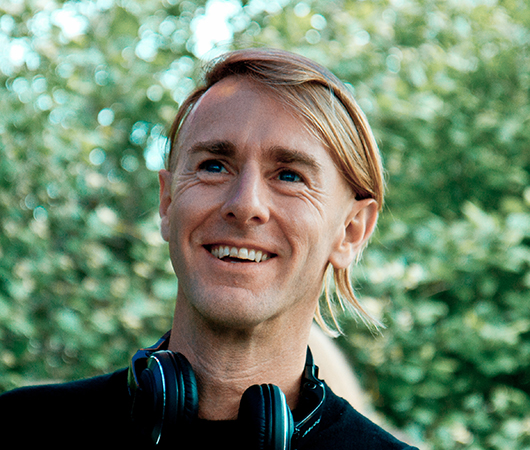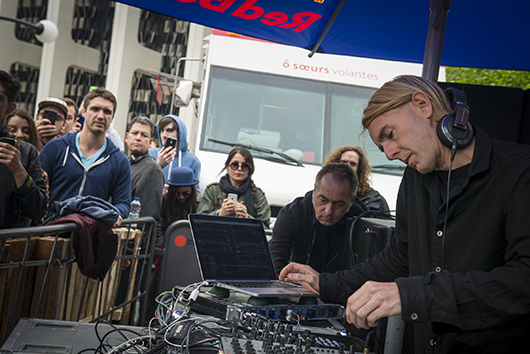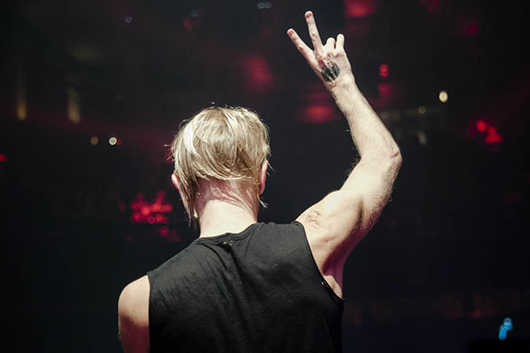Five Minutes at EM15: Richie Hawtin Talks MUTEK, ENTER., and Canadian Techno
Last week, XLR8R made its annual trek to Montreal for MUTEK, which this year teamed […]

Five Minutes at EM15: Richie Hawtin Talks MUTEK, ENTER., and Canadian Techno
Last week, XLR8R made its annual trek to Montreal for MUTEK, which this year teamed […]

Last week, XLR8R made its annual trek to Montreal for MUTEK, which this year teamed up with the organizers from Elektra to deliver a six-day festival called EM15. Our official review detailed the week’s high points, but during our down time, we also took the opportunity to speak with a couple of the festival’s artists. As it turned out, our first conversation was with Canadian techno veteran Richie Hawtin, who actually performed twice during his time at EM15. Our conversation was brief, but we still managed to touch upon Hawtin’s history with MUTEK, the challenge of bringing his ENTER. club night to a festival environment, and why he thinks that Canada has proven to be such a fertile place for techno.
XLR8R: Do you know how many times you’ve played MUTEK over the years?
Richie Hawtin: I don’t know. I did two Plastikman shows, I did a Narod Niki show, which was like a supergroup thing with Ricardo Villalobos, Daniel Bell, and the gang, and then I did another one by myself, and then this year… I’m either at five or six.
You play festivals all the time, but what makes MUTEK different or special for you?
It’s in Canada. [laughs] That’s pretty cool. I guess there’s an explosion of electronic music in North America now, so you can find more and more—I hope—smaller boutique festivals that are actually doing something interesting. But for the last 15 years, the main ones were really MUTEK, Movement, and Decibel. Moogfest is also coming up. (I’m sure I’m forgetting some things, and I’ll probably get raked over the coals for it.) Since the very early days, I had a connection with of course Canada and Montreal, coming up here and doing some radio shows in ’91, ’92, so we always felt that Canada and Quebec were supportive, of not only Plus 8 and our whole path, but also Quebec was very supportive of the arts. So it just made sense that something like MUTEK expanded from here, and I think it’s been instrumental in developing a deeper appreciation of electronic music in North America.
Photo by Caroline Hayeur

MUTEK always has an emphasis on technology, and a forward-thinking outlook, which seems to compliment your own approach. Is that part of the attraction for you as well?
For sure. I do a lot of gigs where I’m “DJ Richie Hawtin,” entertaining, and not everyone knows how or what I’m doing, but the technology, the instruments, and what I’m using and why I’m playing in a certain way is very important to me. So, [it ‘s great] to be at a festival where I can speak about that, or push the idea that electronic dance music isn’t just “boom boom boom” or something that happens in a dark room late at night. It’s much more diverse than that. There are artists really pushing the envelope of what music should or could be, and there are also artists who have gone so far away from it that it’s not even dance music anymore, but they come from that or are inspired by that. Last year, at the ENTER. shows in Ibiza, we had people like Demdike Stare and Carsten Nicolai, and to me, this is all part of the same continuum. It’s not for all of the electronic music fans out there, and I also understand that not all Richie Hawtin fans are as deep into electronic music as I am, but I hope by performing here at MUTEK, or doing weirder Plastikman shows, or this and that, that I can help to open up the world of electronic music to as many of my fans as possible, so they can go beyond me and find a Carl Craig, a Carsten Nicolai, or a Basic Channel and see how rich and diverse the scene is.
MUTEK has always supported Canadian artists, even as many of the country’s techno producers have relocated to Berlin over the years. Yet new Canadian electronic artists continue to pop up. What do you think it is about Canada and techno that keeps turning out new producers?
Let’s say you’re traveling and have an accent. [Someone will say,] “Oh, you’re American.” Canada is always second, like, “Oh, oh, Canadian.” “Oh, you’re from the West Coast? Where? LA?” “No, Vancouver.” “You’re from the East Coast? New York?” “No, Montreal.” In a way, Canada has always been isolated, and because of that, the government has always had an incredible amount of support for the arts, whether it was grants or special programs, especially in Quebec. In the Great White North, I think you just have to look inside yourself and try to create something new. Also, Canada has always been a country that welcomed foreigners—it welcomed me and my parents. Canada is a melting pot. What is a Canadian? There’s no true sense of what a Canadian is. It’s very individualistic, and I think that comes out through the electronic musicians and why it’s been such a cottage industry.
Photo by THIS IS HERD

Your show at EM15 has been billed as an ENTER. night. You’re about to start your third ENTER. season in Ibiza. How do you go about taking that very specific experience and translating it to a festival environment?
It’s difficult, and it’s something that can’t be translated exactly from Ibiza, but for each ENTER. international show, we look at and we try to create… first of all, it’s a musical experience, with production wrapped around it. It’s not as detailed or complicated as Ibiza, because of course there we have 13 or 14 weeks that we can really spend a lot of time on the whole experience. For the international shows, we look at where we’re going to play, whether it’s MUTEK or something like a EDC. We look at what kind of people are coming there and try to build a line-up that’s going to give them something different and expand or at least push the envelope of what they expect electronic music to be—and to celebrate what we love about electronic music. Here [at EM15], in the main room alone, we’ve got Marc Houle, Canadian, an old friend of mine and a Minus alumni, and TM404 and then me. There’s a connection between [TM404] and I with acidic sound and Marc and I. Marc is the king of this game right now with how he does his live performances. We feel that it all makes sense together and it gives that broader perspective of what we think electronic music is, at least what I think electronic music is.

